新概念英语第二册课后题答案详解Lesson71
- 格式:docx
- 大小:38.20 KB
- 文档页数:3


新概念英语第二册答案详解每课的选择题:Lesson 1: bcbdc adbac ccLesson 2: cdcca bbadc dbLesson 3: cacac bccba bbLesson 4: dbabb acbca ccLesson 5: cadbc dabcb bdLesson 6: dacdd adaba daLesson 7: bccda cdacb abLesson 8: dbbac cbbad bbLesson 9: cbdaa bbdbb dcLesson 10: addcb cacac caLesson 11: bbbab ccacc bdLesson 12: ccadd adacd aaLesson : 13 bdbca bbcaa adLesson 14: bcacd bcbcb bbLesson 15: dbcbc dadcc cbLesson 16: aadab adadd daLesson 17: dbbdc cbaac adLesson18 : Bdbdb cdcac cbLesson 19: Adccd bcbca ccLesson 20: Bcbbc bcacc daLesson 21 : cdcda cbbad ccLesson 22: dbddb dacda bbLesson 23: aaacc addbb adLesson 24: baaca acccb abLesson 25: cbbab cdbaa daLesson 26: adcbc ddabd bdLesson 27: dcddd baddc ccLesson 28: cdbbc dbdcd baLesson 29: bccbd babbb cbLesson 30: aadab cccda ddLesson 31: dbaca adabc acLesson 32: cccbb cadad bcLesson 33: dbdac bbccc acLesson 34: dabca dcbcb caLesson 35: adadd adaba ddLesson 36: addcd ccbad ccLesson 37: cbbbb dacdb baLesson 38: bcaac bddba ddLesson 39: dacdd abacc abLesson 40: ccbca acbbb bdLesson 41: aacdc bbada cbLesson 42: dddbb cddac daLesson 43: bbaad daccd acLesson 44: cbccc bdaba bdLesson 45: bdabb dcbcb dbLesson 46: acdda cbcad caLesson 47: dabad aaddc ac Lesson 48: cbcba cbbda bc Lesson 49: dabab ccacc aa Lesson 50: dbacc aadbb cd Lesson 51: bcddd adcad db Lesson 52: bccab dcbac bd Lesson 53: cdacc cdcda cc Lesson 54: dbdbd badcb dd Lesson 55: aabda acabd ab Lesson 56: cacca cabbc cc Lesson 57: abbbb dcdcb da Lesson 58: bdaac bdcad bd Lesson 59: dbddd abada ab Lesson 60: bacbc babac ad Lesson 61: bacca dcabb dd Lesson 62: addcd ccbda db Lesson 63: dbaab ddacd ca Lesson 64: ccccb bccab bb Lesson 65: adbbc aadcc bd Lesson 66: cbaad aabab ba Lesson 67: daddd dbbad dd Lesson 68: bbcdb bbccc aa Lesson 69: abcbb ddaab cd Lesson 70: dbccd bcacd dc Lesson 71: bdbbc cdbbc ba Lesson 72: acadb accdb ad Lesson 73: cadac dadaa db Lesson 74: baccd cacbc ab Lesson 75: cabdb abbdd cc Lesson 76: dbdaa bbacb dd Lesson 77: acabc dddaa ba Lesson 78: acbbc acbab ca Lesson 79: bdcca dbada ac Lesson 80: cbdad cadcc db Lesson 81: daadb bdcbd bd Lesson 82: abadc cdaac bd Lesson 83: bacca bcbcd ab Lesson 84: ccabd cccda cd Lesson 85: ddbab abdbb dc Lesson 86: bcabb bdcab bc Lesson 87: cdcda ccada ad Lesson 88: cbbcc abbcc cb Lesson 89: aadad dadbd db Lesson 90: bccca bcbad dd Lesson 91: dbcbc dbbcb cb Lesson 92: bcdcb abbad ca Lesson 93: cdbac ccdcb db Lesson 94: abcba dacda bc Lesson 95: dabad cdcac dc Lesson 96: dccba dcdab cb这是课后习题的A private conversation私人谈话练习答案 Key to written exercises1.关键句型练习答案A I (1) got (2) very angry (3) .I (1) could not hear (2) the actors (3) .I (1) turned round (2) .I (1) looked at (2) the man and the woman (3) angrily (4) .They (1) did not pay (2) any attention (3) .In the end (6), I (1) could not bear (2) it (3).I (1) turned round (2) again (6) .‘I (1) can't hear (2) a word (3)! ’I (1) said (2) angrily (4) .‘It (1) is (2) none of your business (3) , ’the young man (1) said (2) rudely (4) .‘This (1) is (2) a private conversation(3)!’B 1 I enjoyed the film yesterday.2 I listened to the news carefully.3 The man played the piano well.4 The children played games quietly in their room yesterday.5 He opened the door quietly.6 He left immediately.7 He planted a tree in the corner of the garden.8 He read the letter quickly in his office before lunch.9 I borrowed a book from the library this morning.10 The cook spoilt the soup.11 We stay at home on Sundays.12 There are a lot of people at the bus stop.13 The little boy ate greedily an apple in the kitchen this morning.14 She draws beautifully.15 I like music very much.16 They built a new school in our village last year.17 The match ended at four o'clock.18 She received a letter from her brother last week.Lesson 2Breakfast or lunch?早餐还是午餐?练习答案 Key to written exercises1.关键句型练习答案A 1 are playing…play…is kicking…is running2‘What are you doing?’my landlady asked.‘I'm leaving, Mrs. Lynch, I answered.‘Why are you leaving?’she asked...‘...friends never come to visit me (I)frequently go to bed…I rarely listen…I always feel cold…’B 1 She rarely answers my letters.2 We never work after six o'clock.3 The shops always close on Saturday afternoons.4 Do you always go to work by car?5 Our teacher frequently collects our exercise books.6 We sometimes spend our holidays abroad.7 I often buy CDs.8 Do you ever buy CDs?2.难点练习答案1 What a wonderful garden(this is) !2 What a surprise( this is) !3 What a lot of trouble he is causing!4 What wonderful actors (they are) !5 What a hard-working woman (she is) !6 What a tall building (it is) !7 What a terrible film (it is) !8 What a clever boy you are!9 What a pretty girl (she is) !10 What a strange guy (he is) !Lesson 3Please send me a card请给我寄一张明信片练习答案 Key to written exercises1.关键句型练习答案A went (1.1);visited (1.2) ;sat(1.2) ;taught(1.2);lent;read(1.3) ;did not understand;thought (1.4);passed (1.5) ;did not send(1.5) ;made; go up (1.6) ;bought (1.7) ;spent(1.7) ;did not write(1.8)C …Roy died last year…left me…spent a lot of money…bought one or two…never went to the cinema…stayed at home…listened to music…often lent CDs…they kept them…lost many CDs…2.难点练习答案1 He paid some money to the shopkeeper.2 He handed the prize to me.3 The waiter brought the man a bottle of beer.4 He sold me all his books.5 The shop assistant found me some curtain material.6 He did a big favour for me.7 She showed her new hat to her husband.8 She promised the finder a reward.9 He gave some advice to his son.10 His uncle left some money to/ for him.11 He is teaching us English.12 I bought you this bunch of flowers.13 Bring me that book please.14 He offered a cigarette to me.15 Read the first paragraph to me.16 I've ordered you some soup.17 I owe a lot of money to him.18 Pass your father the mustard.Lesson 4An exciting trip激动人心的旅行练习答案 Key to written exercises1.关键句型练习答案A 1 I have just had breakfast.2 He has been in prison for six months.3 The police have not caught the thief yet.4 You have (already) asked that question three times (already).5 Have you ever been to Switzerland?6 I have never been to Switzerland.7 He is a wonderful runner. He has broken two records so far .8 I haven't seen George lately .C 1 He has just left the house .2 He has just had breakfast .3 She has just written a letter .4 My sister has just turned on the radio .5 My mother has just made the bed .6 She has just bought a new hat.D 1 He hasn't washed the dishes yet .2 She hasn't made the beds yet .3 He hasn't combed his hair yet .4 She hasn't swept the carpet yet .5 We haven't read ‘ Macbeth’yet .E 1 Have you seen the new play at ‘The Globe’yet ?2 Have you taken your holidays yet ?3 Have you read this book yet ?4 Have you done your homework yet ?5 Have you finished your work yet ?2 .难点练习答案1 received2 received3 took4 taken5 takeLesson 5No wrong numbers无错号之虞练习答案 Key to written exercises1.关键句型练习答案A What happened: carried (1.4 ) ; covered (1. 5 )What has happened: has just bought (1.1) ; has just bought (11.3-4);has sent(1.6);has begun(1.8)C 1 What did you buy … ?2 he has never lent …3 Have you burnt … ?4 He fought …5 They have already left .6 When did you lose … ?7 Did you listen … ?8 We have just won …2.难点练习答案A 1 On the way2 in the way3 By the way4 in this/a way5 in the wayB 1 There is a spare wheel in the back of the car.2 I always go on excursions in my spare time.3 ‘Have you any old clothes to spare? ’he asked.4 The guest slept in our spare room.5 ‘Spare me!’begged the prisonerLesson 6Percy Buttons珀西·巴顿斯练习答案 Key to written exercises1.关键句型练习答案A Some meat, a desk, some tobacco, a tin of beans, a comb, acity, a/ some cloth, some oil, a bottle of beer, a day, a word, a student, some sugar, some rain, an orange, a/ some rubberD (sample answers)1 I found an old coin in the garden.2 I put some sugar in my tea.3 I cut some wood for a/ the fire.4 I bought a newspaper yesterday.5 I made some coffee.6 I like the curtains in this room.2.难点练习答案A 1 out 2 over 3 off 4 atB 1 knocked him out2 knock off3 knocked 20% off the priceLesson 7Too late为时太晚练习答案 Key to written exercises1.关键句型练习答案A detectives were waiting(1.1); They were expecting(1.2);detectives were waiting(1.5); others were waiting(1.6);two detectives were keeping guard(11.7-8)B 1 When the plane arrived, some of the detectives were waiting inside the main building while others were waiting on the airfield.2 When two of the detectives opened the parcel, two others were keeping guard at the door.C (sample answers)1 I was getting into my bath when you telephoned me.2 I was reading Hamlet when you saw me in the library this morning.3 I was saying that you must see the new film when you interruped me.D 1 was leaving…arrived 2 worked/ was working…was sitting/ sat3 w as walking…met4 was reading…heard5 was preparing…set/ was setting6 dropped…spoke2.难点练习答案1 He gave all his books away.2 She woke the children up early this morning.4 They cut the king's head off.5 Put your hat and coat on.7 Help me to lift this table up.8 Take your shoes off and put your slippers on.11 They have pulled the old building down.12 Make your mind up.14 She threw all those old newspapers away.Lesson 8The best and the worst最好的和最差的练习答案 Key to written exercises1.关键句型练习答案A 1 Mary's handwriting is worse than Jane's.2 Caroline's handwriting is worse than Mary's and Jane's.3 Caroline's dress is/ was more expensive than Jane's.4 Mary's dress is/ was more expensive than Jane's and Caroline's.B …has the most beautiful garden in our town…‘The Nicest Garden Competition’…garden is larger than Joe's…works harder than Joe and grows more flowers and vegetables…garden is more interesting…for the worst garden in the town!D 1 in 2 of 3 of 4 in2.难点练习答案A 1 believes 2 was 3 triesB Sentences 2, 3 and 5Lesson 10Not for jazz不适于演奏爵士乐练习答案 Key to written exercises1.关键句型练习答案A 1 Our old musical instrument is called a clavichord.2 It was made in Germany.3 It is kept in the living room.4 It was bought many years ago.5 It was damaged recently.6 Two of the strings were broken.7 My father was shocked.8 We aren't allowed to touch it.9 The clavichord is being repaired.2.难点练习答案A 1 of 2 in 3 fromB 1 He borrowed a record of mine.2 She showed me a picture of John's.3 It was an idea of hers.4 A letter of yours was found on my desk.5 Some friends of theirs came to see me.Lesson 252 1.Both my sister and I went shopping.2.We not only got very tired but very hungry as well.3.It was three o\'clock and we could not get lunch so we had a cup of tea.3 1c 2b 3b 4a 5b 6c 7d 8b 9a 10a 11d 12aLesson 261 B believe...are joking...don\'t know...know...believe...forget...looked...are u trying... believe...think...do u live...don\'t know2 \'Look!\'she said,\'isn\'t that man drunk?\'\'I think we should cross the road,\'answered her husband.\'It\'s too late now,\'she replied.\'Eh,you two.Look where you\'re going,\'called the drunk .\'Can\'t u walk in a straight line?\'3 1a 2d 3c 4b 5c 6d 7d 8a 9b 10d 11b 12dLesson 272 1.put their toys away 2.put you up 3.put my shoes on 4.put down5.putting out6.put up7.put off8.put up with3 1d 2c 3d 4d 5d 6b 7a 8d 9d 10c 11c 12cLesson 281 A has just bought(1.2);has had(1.3);has parked(1.4);has not been able(1.5);has put up(1.6);have not had(1.7);has put(1.8);have ever seen(1.9);has been turned(1.10)2 2.who/that 3.whose 4.which 5.that/which3 1c 2d 3b 4b 5c 6d 7b 8d 9c 10d 11b 12aLesson 291 A What happened:flew(1.6);landed(1.8);landed(1.9);wanted(1.10);did not take(1.11) What has happened:has bought(1.1);has begun(1.1);has flown(11.7-8);has just refused(11.9-10)2 1.bring 2.fetch 3.refused 4.deny 5.Very3 1b 2c 3c 4b 5d 6b 7a 8b 9b 10b 11c 12bLesson 301 D 1.Refrigerators are necessary in hot countries.2.Which river is the longest,the Nile,the Amazon,or the Mississippi?3.Heyerdahl crossed the Pacific on a raft.4.Why is Britain sometimes called the United Kingdom?5.We sailed up the Red Sea and then went through the Suez Canal.2 1a 2a 3d 4a 5b 6c 7c 8c 9d 10a 11d 12dLesson 312 1.experienced 2.jobs 3.job 4.save3 1d 2b 3a 4c 5a 6a 7d 8a 9b 10c 11a 12cLesson 322 One day...a postcard...an excursion...one thing...a fax...a form...a fax of one word...3 1c 2c 3c 4b 5b 6c 7a 8d 9a 10d 11b 12cLesson 331 A 1.The girl set out from the coast.2.She jumped into the sea.3.She seam to the shore.B 1.to 2.from/out of 3.(up)to 4.for/from 5.from...to/to...from6.at7.to8.fromC (sample answers)1.A bird flew into the room.2.The parachutist jumped from the aeroplane.3.The child pointed at the fat lady.4.Put the milk in the refrigerator.2 1.the other day 2.passed 3.next 4.past3 1d 2b 3d 4a 5c 6b 7b 8c 9c 10c 11a 12cLesson 342 1.on 2.off 3.out 4.at3 1d 2a 3b 4c 5a 6d 7c 8b 9c 10b 11c 12aLesson 351 C 1.mean...Do u understand ed to smoke...dose not smoke 3.was completed 4.have not seen 5.dropped...was crossing2 1.so 2.such as 3.so 4.such 5.so 6.such a 7.such an3 1a 2d 3a 4d 5d 6a 7d 8a 9b 10a 11d 12dLesson 361 C 1.We are going to leave at six o\'clock.2.I am going to pay these bills tomorrow.3.Are you going to write to him?4.She is not going to look for a new job.5.When are you going to buy a new car?2 1.firm 2.watched 3.look at 4.aolid/firm 5.firm3 1a 2d 3d 4c 5d 6c 7c 8b 9a 10d 11c 12cLesson 372 1.holding...looking forward to 2.look out 3.look...up4.is holding5.look...up6.held...looking forward to3 1c 2b 3b 4b 5b 6d 7a 8c 9d 10b 11b 12cLesson 382 A 1.I had no sooner left the house than it began to rain.2.We had no sooner hung the picture on the wall than it fell down.B 1.continuously 2.continually 3.country3 1b 2c 3a 4a 5c 6b 7d 8d 9b 10a 11d 12dLesson 391d 2a 3c 4d 5d 6a 7b 8a 9c 10c 11a 12bLesson 401 1.were 2.tries 3.will burn 4.would have to 5.lost6.do not apologize7.were8.won9.would not be 10.could2 1.made...to 2.does...makes 3.doing...making 4.made (i)3 1c 2c 3b 4c 5a 6a 7c 8b 9b 10b 11b 12dLesson 411 C 1.mustn\'t 2.mustn\'t 3.needn\'t 4.needn\'t 5.mustn\'t2 1.remarked 2.noticed 3.remarks 4.notice3 1a 2a 3c 4d 5c 6b 7b 8a 9d 10a 11c 12bLesson 421 A 1.had had a long walk(1.1) 2.have a rest(1.2)3.to have a look(1.4)4.had our first glimpse(1.6)B 1.had a ride 2.was having a look 3.had a wash 4.had am5.had a fight6.have had a quarrel7.had another try8.having a rest9.have a smoke 10.have a good sleep2 1.pick it up 2.pick up 3.pick out 4.pick up3 1d 2d 3d 4b 5b 6c 7d 8d 9a 10c 11d 12aLesson 431 A were able to take(1.3);could...get over(1.6);was then able to rise(1.8);would be able to reach(1.9);was able to fly(1.10)2 1.at last 2.at home 3.at once 4.at the moment5.at times6.was at a loss7.At first3 1b 2b 3a 4a 5d 6d 7a 8c 9c 10d 11a 12cLesson 441 A tried to steal(1.4);started running(1.5);continued to run(1.7);needs mending(1.10)B 1.to see 2.working 3.ironing 4.to leave 5.to argue/arguing 6.to come7.seeing 8.knocking 9.waiting 10.to rain/raining 11.working 12.taking2 1.(sample sentences)In the last minutes orf the race,Jim caught up with the leader and passed him.2.The famer shouted at the children and they ran way.3 1c 2b 3c 4c 5c 6b 7d 8a 9b 10a 11b 12dLesson 451 A had been lost(11.1-2);must have been found(11.3-4);was not returned(1.4);had been wrapped(1.6);was sent(1.9);was paid back(1.10)C 1.A meal has been prepared for you.2.The book will be translated into English.3.A telegram must be sent to him.4.The fire had been put out before the fire brigade arrived.5.The cat was given some milk to drink.2 1.back 2.robbed...stole 3.back 4.stole 5.robbed3 1b 2d 3a 4b 5b 6d 7c 8b 9c 10b 11d 12bLesson 461 A arrived at Sydney(1.1);could account for the fact(1.3);accurred to one(1.4);was astonished at what(1.5);was so surprised at being(11.6-7);had been confined to the wooden box(1.9);B 1.with 2.to...for 3.with 4.for 5.to 6.at 7.to 8.to9.for 10.to...at 11.at 12.with 13.with 14.to...for 15.for 16.for17.with 18.for 19.at 20.with 21.to 22.with 23.at 24.to25.with...to 26.to...with 27.for 28.to...to 29.for 30.to 31.for 32.to33.to...with 34.for 35.to 36.to 37.at 38.at 39.with 40.for2 1a 2c 3d 4d 5a 6c 7b 8c 9a 10d 11c 12aLesson 471 C 1.will have finished 2.broke 3.were 4.couldD 1.mustn\'t 2.needn\'tE 1.I asked George what those people were looking at.2.George answered that he did not know.He thought a new road was being built and thatit would be finished soon.3.I told George that all those people were silly because they were looking into an empty hole.4.George said that some piople enjoy/enjoyed watching others work.5.Half an hour passed.George told me to hurry up as we had been there for half an hour.He added that there was nothing to see in an empty hole.6.i answered that I didn\'t want to go yet because it was very interesting.2 1d 2a 3b 4a 5d 6a 7a 8d 9d 10c 11a 12cLesson 481 A 1.which 2.denied 3.fetched 4.too 5.jobs 6.One...a...who7.past 8.next 9.watching 10.continually 11.remarked 12.robbedB (sample sentences)I\'m sorry to cause you such trouble.Have you ever seen such beartiful pictures before?It\'s such a nice day that we can\'t stay indoors!I\'m feeling so tired that I shall have to stop work.C 1.He had no sooner come home than they rang him up from the office.2.The plane had no sooner taken off than it returned to the airport.D 1.made 2.do 3.make 4.do 5.Do 6.make 7.made 8.doesE 1.ou每课的填空题L2Are playing…play…is kicking…is running…are doing…am leaving…arele aving…come…go…listen…feel…L3B went; visited; sat; taught; lent; read; didn’t understand; thought; passed; didn’t send; made; got; bought; spent; didn’t write.C died; left; spend; bought; went; stayed; listened; lent; keep; lost.L4A练习自己做B看课文C 1.He has just left the house.2. he has just had breakfast3. she has just written a letter.4. My sister has just turned on the radio5. My mother has just made the bed6. She has just bought a new hatD1.he hasn’t washed the dishes yet2.she hasn’t made the b eds yet3.he hasn’t combed his hair yet4.she hasn’t swept the carpet yet5.we haven’t read “Macbeth”yetE1. have you seen the new play at”the Glob”yet?2. Have you taken your holidays yet?3. Have you read this book yet?4. Have you done your homework yet?5. Have you finished your work yet?L5B参照课文C1. did buy2. lent3. have you burnt4. fought5. left6. did lose7. did you listen8. have just won用带way的短语填空1. on the way2. in the way3. by the way4. in this way5. in the wayL6P33的参考课文P34A 1.out 2. Over 3.off 4. AtB 1.knocked him out 2. Knock off 3. Knocked 20% off the priceL7P37 D1. was leaving…arrived2. was working…was sitting3. was walking…met4. was reading…heard5. was preparing…was setting6. dropped…spokeL8P42 D 1.in 2.of 3.of 4.in下面235填forL9P45 B1.in2.on3. In4. In5. At6. On…in7. In8. At…in9. untilL10 P501. of2. In3.fromL11 P53B参考课文C1 gets…got2. had3. was writing…talked4. am typing5. passed/were passingDWas built had become died was built were called was begun was completed cost has been cisitedP54 B 1.me to help him 2. Preferred her to stay at home 3.me to speak Chiese 4.me to collect the laundry 5.her to visit you1. salary2.lent…salary3.borrowed4.wages5.wages参考课文的填空我就不写了L13 P63Will be arriving will be coming will be meeting will be singing will be staying will be tryingL14 P661. regretted2.had begun3.arrivedL15 P70B 1.told…would come2. said…had cut3. told…had4. did…say5. did…tell…would buy6. said… could not7. said…had worked8. told…wrote9. did…say…were10. said…would wait1. study2. office3. nervous4. afford5. irritableL16 P73 C1. rains2. pass3. is4. will get5. enjoys6. isD listen do don’t shout is don’t blame want don’t forget am playing don’t send ask is don’t putL18 P82 A1. back2. away3. in4. inB 1.besides 2.besideL21 P94 B1. home2. houses3. house4. homeL22 P971. from2.on3.in4.on5.from6.from7.of8.on9.from 10.in 11.on…in 12.of 13.in 14.on 15.of 16.of 17.from 18.of…on 19.on 20.of…of 21.of 22.from 23.of 24.from 25.in 26.on 27.on 28.from 29.on 30.in 31.from 32.on 33.on 34.in 35.in 36.from 37.on 38.on 39.in 40.of 41.on 42.on 43.of 44.in 45.of 46.in 47.from 48.of 49.in 50.on 51.on 52.of 53.from 54.inL23 P101 C1. wrote2. had finished3. breaks4. shall/will goD 1.told would2. told had lose3. said didn’t likeP1021. It2. There3. There4. There5. It6. It7. There8. It9. There10. ItL24 P106 F1. off2.back3.up4.over5.on6.awau L27 P1321. put…back2. put…up3. put…away4. put down5. put out6. put up7. put off8. put up withL28 P1361. that/which2. who/that3. whose4. which5. that/which6. that/which7. who/whom。

Lesson 71 A famous clock【New words and expressions】(9)parliament n. 議會,國會erect v. 建起accurate adj. 準確的official n. 官員,行政人員Greenwich n. 格林尼治observatory n. 天文臺check v. 檢查microphone n. 擴音器,麥克風tower n. 塔★parliament (英)議會,國會(美)Congressmember of parliament英》下院議員、國會議員【略】MPcongressman(米國の)國會議員congresswoman 〈米〉女性下院議員、女性國會議員parliament:the Upper Chamber / House 上議院the Lower Chamber / House 下議院Congress :Senate n.參議院,上院;the House of Representatives眾議院★erect1.)v. 建起=set up , put up , buildeg:They are planning to erect a monument. 他們計劃豎立紀念碑。
2.)vt.建造;豎立,使直立erect a flagpole豎旗杆;erect a tent搭起帳篷elect vt.選舉,推舉;選擇vi.進行選舉,作出選擇erupt vi.(火山等)噴發,噴出;(戰爭等)爆發★accurate adj. 準確無誤free from error無誤差的←→inaccurate不精確的an accurate clock準確的鐘;an accurate map準確地圖accurate figures準確的數字;an accurate report 準確的報告eg:Is your watch accurate ?你的錶是否準確?eg:He is accurate in his judgment.(n.意見判斷(力))他的判斷是準確的。

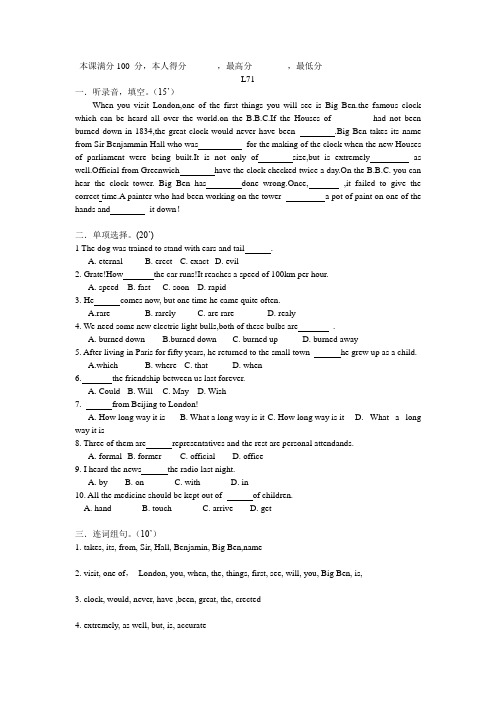
本课满分100 分,本人得分_______,最高分________,最低分_________L71一.听录音,填空。
(15’)When you visit London,one of the first things you will see is Big Ben.the famous clock which can be heard all over the world.on the B.B.C.If the Houses of ________ had not been burned down in 1834,the great clock would never have been .Big Ben takes its name from Sir Benjammin Hall who was for the making of the clock when the new Houses of parliament were being built.It is not only of size,but is extremely as well.Official from Greenwich have the clock checked twice a day.On the B.B.C. you can hear the clock tower. Big Ben has done wrong.Once, ,it failed to give the correct time.A painter who had been working on the tower a pot of paint on one of the hands and it down!二.单项选择。
(20’)1 The dog was trained to stand with ears and tail .A. eternalB. erectC. exactD. evil2. Grate!How the car runs!It reaches a speed of 100km per hour.A. speedB. fastC. soonD. rapid3. He comes now, but one time he came quite often.A.rareB. rarelyC. are rareD. realy4. We need some new electric light bulls,both of these bulbs are .A. burned downB.burned downC. burned upD. burned away5. After living in Paris for fifty years, he returned to the small town he grew up as a child.A.whichB. whereC. thatD. when6. the friendship between us last forever.A. CouldB. WillC. MayD. Wish7. from Beijing to London!A. How long way it isB. What a long way is itC. How long way is itD. What a long way it is8. Three of them are representatives and the rest are personal attendands.A. formalB. formerC. officialD. office9. I heard the news the radio last night.A. byB. onC. withD. in10. All the medicine should be kept out of of children.A. handB. touchC. arriveD. get三.连词组句。

71-75新概念2课後答案新概念英语第二册课后习题答案详解Lesson 711. b 根据课文第3-4行If the Houses of Parliament had not been burned down in1834 可以判断只有b.符合课文内容,其他3个选择都与课文实际内容不符。
2. d 根据课文第8行Officials from Greenwich Observatory have the clock checkedtwice a day 可以判断只有d与课文事实相符,其他3个选择都与事实不符.课文中用的是have sth.done 的形式,那么就是说是official让别人来检查clock, 但是检查clock的也可以是official啊, 某个official让另外一个人去检查,这个人不是他本人,是另外的officail 也是可以的啊.3. b 本句前半句陈述的是一个公认的事实,后半句则表示一个经常性或习惯性的动作,应该用一般现在时才符合逻辑,即“每当你到伦敦的时候”。
a.will visit c. have visited , d. will be visiting 这3个选择时态都不对,只有b.visit 是一般现在时,最符合语法,所以应该选b.4. b 只有选b. 最符合题目意思,符合语法。
a. famousest 不是正确的最高级形式,famous 的最高级应该是the most famous; c. the more famous:比较级前不应该有定冠词,另外本句也没有表示比较的连词than; d.famouser 不是正确的比较级形式。
5. c 本句若选a. and, b. also, d. together都不合乎语法,也不符合题目意思,只有选c.both才合乎语法,意思通顺.所以选c.6. c 该句是疑问句,因此需要用疑问句的语序,b. they have it 和d. they do have it都是陈述句语序,所以都不能选;a. have they it 意思不完整;只有c. do they have it是疑问句语序而且符合题目意思,所以选c.7. d a. who, b. had been, c. had 都不合乎语法,只有不加任何词,这个句子才是正确的,所以选d.8. b 前一句中的erected 意思为“建造,建立”,该句只有选b. up 与put 构成词组表示建造,与erected的含义相同,这样一来两个句子的意思才吻合。

新概念第二册课后题答案详解Lesson71新概念英语第二册课后习题Lesson 711. b根据课文第3-4行If the Houses of Parliament had not been burned down in 1834 能够判断只有b.符合课文内容,其他3个选择都与课文实际内容不符。
2. d根据课文第8行Officials from Greenwich Observatory have the clock checked twice a day 能够判断只有d与课文事实相符,其他3个选择都与事实不符.课文中用的是have sth.done 的形式,那么就是说是official让别人来检查clock, 但是检查clock 的也能够是official啊, 某个official让另外一个人去检查,这个人不是他本人,是另外的officail 也是能够的啊.3. b本句前半句陈述的是一个公认的事实,后半句则表示一个经常性或习惯性的动作,应该用一般现在时才符合逻辑,即“每当你到伦敦的时候”。
a. will visit c. have visited , d. will be visiting 这3个选择时态都不对,只有b. visit 是一般现在时,最符合语法,所以应该选b.4. b只有选b. 最符合题目意思,符合语法。
a. famousest 不是准确的级形式,famous 的级应该是the most famous; c. the more famous:比较级前不应该有定冠词,另外本句也没有表示比较的连词than; d. famouser 不是准确的比较级形式。
5. c本句若选a. and, b. also, d. together都不合乎语法,也不符合题目意思,只有选c. both才合乎语法,意思通顺.所以选c.6. c该句是疑问句,所以需要用疑问句的语序,b. they have it 和d. they do have it 都是陈述句语序,所以都不能选;a. have they it意思不完整;只有c. do they have it 是疑问句语序而且符合题目意思,所以选c.7. da. who,b. had been,c. had 都不合乎语法,只有不加任何词,这个句子才是准确的,所以选d.8. b前一句中的erected 意思为“建造,建立”,该句只有选b. up与put 构成词组表示建造,与erected 的含义相同,这样一来两个句子的意思才吻合。
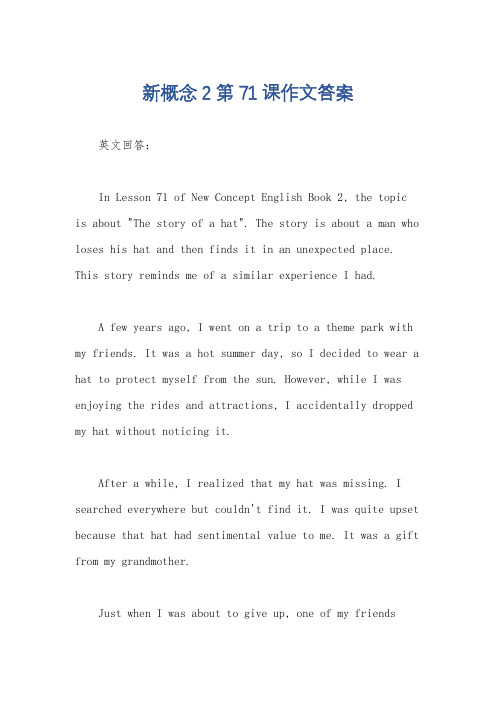
新概念2第71课作文答案英文回答:In Lesson 71 of New Concept English Book 2, the topic is about "The story of a hat". The story is about a man who loses his hat and then finds it in an unexpected place. This story reminds me of a similar experience I had.A few years ago, I went on a trip to a theme park with my friends. It was a hot summer day, so I decided to wear a hat to protect myself from the sun. However, while I was enjoying the rides and attractions, I accidentally dropped my hat without noticing it.After a while, I realized that my hat was missing. I searched everywhere but couldn't find it. I was quite upset because that hat had sentimental value to me. It was a gift from my grandmother.Just when I was about to give up, one of my friendscalled out to me and pointed to a tree nearby. To my surprise, my hat was hanging on one of the branches! Itmust have gotten caught on the tree when I dropped it.I was overjoyed and relieved to have found my hat. It was like finding a needle in a haystack. From that day on,I always make sure to double-check my belongings and keep a close eye on them.中文回答:在《新概念英语》第二册第71课中,讲述的是“一顶帽子的故事”。


新概念英语第二册课后练习题答案详解(第71课)新概念英语第二册课后习题Lesson 711. b根据课文第3-4行If the Houses of Parliament had not been burned down in 1834 能够判断只有b.符合课文内容,其他3个选择都与课文实际内容不符。
2. d根据课文第8行Officials from Greenwich Observatory have the clock checked twice a day 能够判断只有d与课文事实相符,其他3个选择都与事实不符.课文中用的是have sth.done 的形式,那么就是说是official让别人来检查clock, 但是检查clock 的也能够是official啊, 某个official让另外一个人去检查,这个人不是他本人,是另外的officail 也是能够的啊.3. b本句前半句陈述的是一个公认的事实,后半句则表示一个经常性或习惯性的动作,应该用一般现在时才符合逻辑,即“每当你到伦敦的时候”。
a. will visit c. have visited , d. will be visiting 这3个选择时态都不对,只有b. visit 是一般现在时,最符合语法,所以应该选b.4. b只有选b. 最符合题目意思,符合语法。
a. famousest 不是准确的级形式,famous 的级应该是the most famous; c. the more famous:比较级前不应该有定冠词,另外本句也没有表示比较的连词than; d. famouser 不是准确的比较级形式。
5. c本句若选a. and, b. also, d. together都不合乎语法,也不符合题目意思,只有选c. both才合乎语法,意思通顺.所以选c.6. c该句是疑问句,所以需要用疑问句的语序,b. they have it 和d. they do have it 都是陈述句语序,所以都不能选;a. have theyit 意思不完整;只有c. do they have it 是疑问句语序而且符合题目意思,所以选c.7. da. who,b. had been,c. had 都不合乎语法,只有不加任何词,这个句子才是准确的,所以选d.8. b前一句中的erected 意思为“建造,建立”,该句只有选b. up 与put 构成词组表示建造,与erected 的含义相同,这样一来两个句子的意思才吻合。
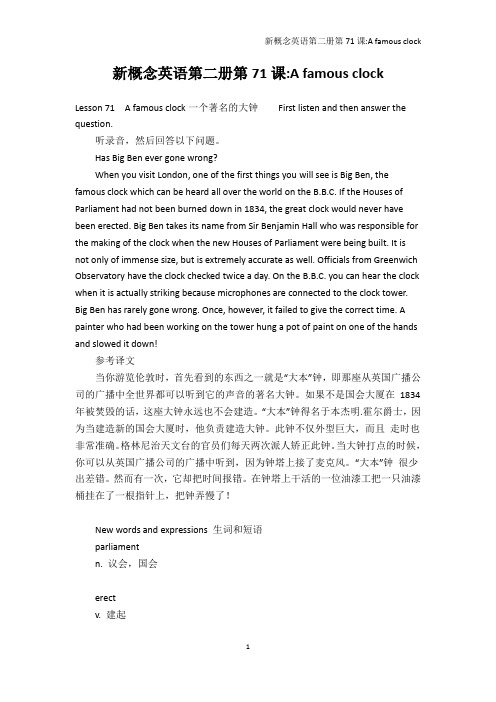
新概念英语第二册第71课:A famous clockLesson 71 A famous clock一个著名的大钟First listen and then answer the question.听录音,然后回答以下问题。
Has Big Ben ever gone wrong?When you visit London, one of the first things you will see is Big Ben, the famous clock which can be heard all over the world on the B.B.C. If the Houses of Parliament had not been burned down in 1834, the great clock would never have been erected. Big Ben takes its name from Sir Benjamin Hall who was responsible for the making of the clock when the new Houses of Parliament were being built. It is not only of immense size, but is extremely accurate as well. Officials from Greenwich Observatory have the clock checked twice a day. On the B.B.C. you can hear the clock when it is actually striking because microphones are connected to the clock tower. Big Ben has rarely gone wrong. Once, however, it failed to give the correct time. A painter who had been working on the tower hung a pot of paint on one of the hands and slowed it down!参考译文当你游览伦敦时,首先看到的东西之一就是“大本”钟,即那座从英国广播公司的广播中全世界都可以听到它的声音的著名大钟。
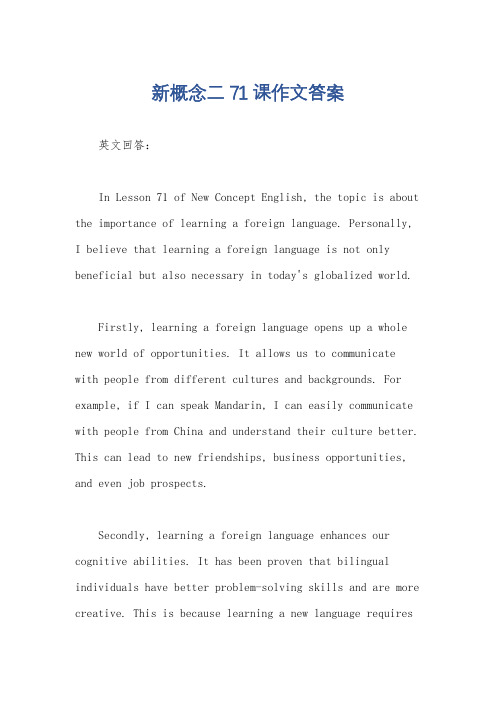
新概念二71课作文答案英文回答:In Lesson 71 of New Concept English, the topic is about the importance of learning a foreign language. Personally, I believe that learning a foreign language is not only beneficial but also necessary in today's globalized world.Firstly, learning a foreign language opens up a whole new world of opportunities. It allows us to communicate with people from different cultures and backgrounds. For example, if I can speak Mandarin, I can easily communicate with people from China and understand their culture better. This can lead to new friendships, business opportunities, and even job prospects.Secondly, learning a foreign language enhances our cognitive abilities. It has been proven that bilingual individuals have better problem-solving skills and are more creative. This is because learning a new language requiresus to think outside the box and adapt to differentlinguistic structures. For instance, when I was learning French, I had to understand the grammatical rules and apply them in real-life situations. This improved my overall cognitive skills and made me more flexible in my thinking.Furthermore, learning a foreign language can also boost our career prospects. In today's globalized job market, employers highly value individuals who are proficient in multiple languages. For example, if I am applying for a job in an international company, knowing a foreign language such as Spanish or German can give me a competitive edge over other candidates. This is because I can communicate with clients from different countries and understand their needs better.In conclusion, learning a foreign language is not only important but also necessary in today's globalized world.It opens up opportunities, enhances cognitive abilities, and improves career prospects. Therefore, I strongly believe that everyone should invest their time and effortin learning a foreign language.中文回答:新概念英语第71课是关于学习外语的重要性。

Lesson 71 A famous clock•Big Benthe Houses of Parliament国会大厦Greenwich Observatory 格林尼治天文台The microphones are connected to the clock tower,so the famous clock can be heard all over the world on the BBC.1.区分build/ found/ erect/establish•均有“建设,建立,建造”之意。
•build:普通用词,含义广泛,可指一切具体或抽象的建造或建立。
eg.He built a model ship out of wood. 他用木头造了个模型船。
•found:侧重打下基础或创办,具体或抽象事物均可用eg.The pilgrims founded a colony in Portsmouth.清教徒们在普利茅斯创建了一个殖民地。
•erect:侧重指对高而垂直物的建造。
使用不如build广泛。
eg.A monument was erected in front of the town hall.一座纪念碑在市政厅前建起。
•establish:着重稳固地建成,可具体指国家、政府、学校或商店等的建立,也可指信仰、信用、名誉、法律、制度、规则等的建立。
eg.The Minister established a commission to suggest improvements in the educational system."部长组织了一个研究组,为改进教育制度提供建议。
"2.accurate•注意在指精确时,accurate前不可加too等表达更进一步增加或减少精确程度的词。
•accurate的基本意思是“精确的,精密的”,指由于谨慎细心而精确地固守事实和真理,与事实无出入,含有为避免误差或偏离理想的模式要花费不少精力的意思,可表示提供的信息准确,也可表示掷、射、击等准确,还可以表示某事物“正确无误”。

The Power of a SmileSmiles are powerful tools that can transform lives and create positive change in the world. They are universal, crossing all barriers of language and culture, and have the ability to brighten even the darkest of days. The simpleact of smiling can convey warmth, happiness, and acceptance, making it a powerful form of communication.The benefits of smiling are numerous. It has been scientifically proven that smiling releases endorphins, the "happy hormones" in our brain, which help to reduce stress and improve mood. Smiling also has a positive impact on our physical health, as it can lower blood pressure, reduceheart rate, and improve overall well-being.Beyond the individual benefits, smiles have the ability to spread positivity and create a ripple effect in thelives of others. When we smile at someone, they are likelyto smile back, creating a bond of friendliness and connection. This simple act of kindness can brighten someone's day and make them feel more included and valued.In today's world, where stress and anxiety are on the rise, the power of a smile becomes even more important. A smile can be a powerful antidote to negativity and a reminder that there is still good in the world. It can serve as a beacon of hope in difficult times, inspiring others to persevere and face challenges with courage and optimism.However, the power of a smile is not limited to personal interactions. It can also be a powerful tool for social change. Smiling can break down barriers and promote unity among people of different backgrounds and beliefs. It can foster understanding and tolerance, leading to a more inclusive and harmonious society.Moreover, smiling is a form of non-verbal communication that can be used effectively in various situations. It can diffuse tense situations, ease conflicts, and create a positive atmosphere. In business settings, smiling canbuild trust and rapport with clients and colleagues, fostering a culture of cooperation and mutual respect.In conclusion, the power of a smile is immeasurable. It has the ability to transform lives, spread positivity, andcreate positive change in the world. From personal interactions to social change, the simple act of smilingcan have far-reaching effects. Let us remember to smileoften and share the power of positivity with the world.**微笑的力量**微笑是一种强大的工具,能够改变生活,为世界带来积极的变化。


新概念英语第二册71课课后习题详细答案
新概念英语第二册课后习题答案详解Lesson 71
练习答案Key to written exercises
1.关键句型练习答案
C 1 shall have been working
2 have finished
D 1 had to go
2 should/ought to buy
3 should/ ought to have telephoned 2.难点练习答案
1 shop assistant
2 hung
3 hanged 3.多项选择题答案
1. b
根据课文第3-4行If the Houses of Parliament had not been burned down in 1834 可以判断只有b.符合课文内容,其他3个选择都与课
相同.a. the hour 不能引导从句, c. really, d. indeed 都是副词,都不能引导从句,只有b. the moment(当……时,一……就)与when 意思相同,并可以引导时间状语从句,所以选b.
12. a
went slowly 慢慢地走,和前一句的the clock slowed down(钟变慢了)意思不同.
只有a. was slow(慢了)和前一句意思相符合,所以选 a. 而 b. was behind(在后面), c. went back(回去), d. went slowly(慢慢地走)都与前一句含义不符合.。
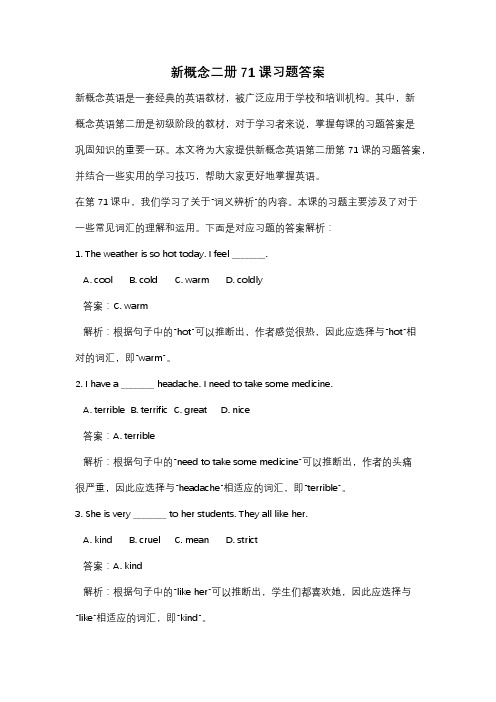
新概念二册71课习题答案新概念英语是一套经典的英语教材,被广泛应用于学校和培训机构。
其中,新概念英语第二册是初级阶段的教材,对于学习者来说,掌握每课的习题答案是巩固知识的重要一环。
本文将为大家提供新概念英语第二册第71课的习题答案,并结合一些实用的学习技巧,帮助大家更好地掌握英语。
在第71课中,我们学习了关于“词义辨析”的内容。
本课的习题主要涉及了对于一些常见词汇的理解和运用。
下面是对应习题的答案解析:1. The weather is so hot today. I feel ________.A. coolB. coldC. warmD. coldly答案:C. warm解析:根据句子中的“hot”可以推断出,作者感觉很热,因此应选择与“hot”相对的词汇,即“warm”。
2. I have a ________ headache. I need to take some medicine.A. terribleB. terrificC. greatD. nice答案:A. terrible解析:根据句子中的“need to take some medicine”可以推断出,作者的头痛很严重,因此应选择与“headache”相适应的词汇,即“terrible”。
3. She is very ________ to her students. They all like her.A. kindB. cruelC. meanD. strict答案:A. kind解析:根据句子中的“like her”可以推断出,学生们都喜欢她,因此应选择与“like”相适应的词汇,即“kind”。
4. The movie was ________. I couldn't stop laughing.A. boringB. excitingC. interestingD. funny答案:D. funny解析:根据句子中的“couldn't stop laughing”可以推断出,电影很有趣,因此应选择与“laughing”相适应的词汇,即“funny”。

A famous clock一个的大钟-新概念英语第二册自学导读笔记及课后答案第71课新概念英语第一册第71课课文重难点 further notes on the text1.if the houses of parliament had not been burned down in 1834, the great clock would never have been erected. 如果不是国会大厦在1834年被焚毁的话,这座大钟永远也不会建造。
(1)这句话用的是虚拟语气,即第3类条件句,表示与过去的事实相反的一种假设。
(cf.第64课语法)(2)the houses of parliament,国会大厦。
因为英国议会是由上议院(house of lords)和下议院(house of commons)组成的,所以houses为复数形式。
(3)burn down为固定短语,在这里表示"(使)烧成平地"、"烧毁":the hospital was burned down last month.那家医院上个月被烧毁了。
2.big ben takes its name from sir benjamin hall who was respon- sible for the making of the clock…"大本"钟得名于本杰明·霍尔爵士,……他负责建造大钟。
(1)sir用于英国人的全名(或名字)之前时表示"爵士"(不单独用于姓之前),如 sir john gilbert(约翰·吉尔伯特爵士)或 sir john(约翰爵士),但不能称 sir gilbert。
(2)responsible for表示"对……需负责任/承担责任的":who is responslble for the accident?谁应对这起事故负责?john is responsible for the building of the bridge. 约翰负责修建这座桥。
新概念英语第二册课后题答案详解Lesson71
1. b
根据课文第3-4行If the Houses of Parliament had not been burned down in 1834 能够判断只有b.符合课文内容,其他3个选择都与课文实际内容不符。
2. d
根据课文第8行Officials from Greenwich Observatory have the clock checked twice a day 能够判断只有d与课文事实相符,其他3个选择都与事实不符.
课文中用的是have sth.done 的形式,那么就是说是official
让别人来检查clock, 但是检查clock 的也能够是official啊, 某个official让另外一个人去检查,这个人不是他本人,是另外的officail 也是能够的啊.
3. b
本句前半句陈述的是一个公认的事实,后半句则表示一个经常性或习惯性的动作,应该用一般现在时才符合逻辑,即“每当你到伦敦
的时候”。
a. will visit c. have visited , d. will be visiting 这3个选择时态都不对,只有b. visit 是一般现在时,最符合语法,所以应该选b.
4. b
只有选b. 最符合题目意思,符合语法。
a. famousest 不是准确的级形式,famous 的级应该是the most famous; c. the more famous:比较级前不应该有定冠词,另外本句也没有表示比较的连词than; d. famouser 不是准确的比较级形式。
5. c
本句若选a. and, b. also, d. together都不合乎语法,也不符
合题目意思,只有选c. both才合乎语法,意思通顺.所以选c.
6. c
该句是疑问句,所以需要用疑问句的语序,b. they have it 和d. they do have it 都是陈述句语序,所以都不能选;a. have they
it 意思不完整;只有c. do they have it 是疑问句语序而且符合题目意思,所以选c.
7. d
a. who,
b. had been,
c. had 都不合乎语法,只有不加任何词,这个句子才是准确的,所以选
d.
8. b
前一句中的erected 意思为“建造,建立”,该句只有选b. up 与put 构成词组表示建造,与erected 的含义相同,这样一来两个句
子的意思才吻合。
而其他3个选择都不符合题目意思。
9. b
只有b. duty(责任,职责)才能同前一句意义相同. a. responsible(负责的)虽然词意思准确,但词性不对,应该是名词才适合
这个句子.c. charge(责任,职责)虽然词义和词性都准确,但一般不用
在这类句子中,而常用在词组中,如in charge of , take the charge
of等, d. control(控制,支配)不符合题目意思.
10. c
前句中的immense意思是巨大的,庞大的,该句需要一个与它含义
相同的形容词,才能使这两个句子意义相同.
a. great(大的,重大的)主要强调等级上重要的,
b. large(大的,巨大的)主要强调空间的宽敞,广博;
c. huge(非常大的,巨大的,庞大
的)主要指体积的大; d. big(大的)主要指体积的大,也可指力量的大,但它强调超出一般体积或水准的大.这4个中只有c. huge与immense 含义最接近,所以选c.
11. b
该句需要选出一个与前一句引导时间状语从句的连词when意义相同的词,以使两个句子意思相同.a. the hour 不能引导从句, c. really, d. indeed 都是副词,都不能引导从句,只有b. the moment(当……时,一……就)与when 意思相同,并能够引导时间状语从句,所以选b.
12. a
went slowly 慢慢地走,和前一句的the clock slowed down(钟变慢了)意思不同.
只有a. was slow(慢了)和前一句意思相符合,所以选a. 而b. was behind(在后面), c. went back(回去), d. went slowly(慢慢地走)都与前一句含义不符合.。